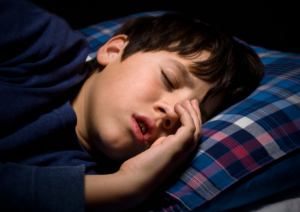Do you grind or clench your teeth?
This condition is called bruxism. An involuntary movement disorder where you may unknowingly clench your teeth when you’re awake (awake bruxism) or clench or grind them during sleep (sleep bruxism).
Severe bruxism can affect your quality of life – it can lead to damaged, sensitive and worn out teeth, jaw disorders, headaches, and other problems.
Dentists have seen more cases related to bruxism or excessive teeth grinding in Singapore since Covid-19.
Causes of Bruxism
Bruxism may be due to a combination of physical, genetic and psychological factors. A high intake of alcohol and caffeine and medication such as antidepressants and certain illegal drugs can worsen bruxism.
Sleep bruxism is more likely caused by an abnormal bite or missing or crooked teeth. It can also be caused by sleep disorders such as sleep apnea. It is much harder for people to know that they are grinding their teeth while sleeping, so they tend to clench and grind their teeth with greater force.
According to Dr Yue Weng Cheu, the clinical director of DP Dental, what happens during obstructive sleep apnoea is worrying.
When the throat muscles relax during sleep and block the airway to the extent of interrupting breathing, the body sends out a stress response to raise heart and respiratory rates to get in more oxygen.
Sometimes, this stress response increases muscle activity in the jaw, leading to clenching or grinding during sleep.
According to Dr Yue, sleep bruxism could also be caused by the way you breathe.
“Mouth breathers, for instance, condition their tongues to lay low in the mouth during the day. And when they continue to mouth-breathe at night, they suffer the consequences of airway obstruction or resistance, resulting in snoring and sleep bruxism,” says Dr Yue.

Symptoms of bruxism
Some commonly seen symptoms of bruxism are:
- Teeth grinding and clenching
- Facial pain
- Dull headaches starting in the temples
- Earache
- Pain and stiffness in the jaw joint (temporomandibular joint) and surrounding muscles, which can lead to temporomandibular disorder (TMD)
- Disrupted sleep
- Worn-down teeth, which can lead to increased sensitivity and even tooth loss
- Broken teeth or fillings
- Damage from chewing on the inside of your cheek
Grinding can wear off the outermost protective enamel of the teeth.
According to Dr Yue, “Sometimes, we don’t see the grind marks or facets clearly, but we can detect craze lines (cracks in the enamel) in the teeth.”
People who have weaker tooth enamel will have a higher risk of tooth breakage if bruxism persists.
In fact, those with the habit of cracking open crab shells, nuts, ice cubes and chicken bones with their teeth run higher risks of tooth breakage.
Treatment for bruxism
Treatment for bruxism is usually a combination of managing the symptoms and tackling the root cause.
Here are some options for managing bruxism:
Schedule regular visits to the dentist
Dental exams are the best way to identify bruxism. A dentist can spot signs of it in your teeth and jaw from regular visits.
Mouth Guard
Mouth-guards or dental splints are used to minimise wear and tear and reduce damage to the teeth and mouth because of sleep bruxism.
Your dentist usually customises dental splints for your mouth. It is best not to get them over the counter.
According to Dr Yue, “Using a mouthguard from the sports store is like using a pair of shoes you picked up on the street. If the fit is not good, the muscles will suffer.”

Tackling the Root Cause
However, a mouth guard doesn’t directly address the root cause of bruxism, which can sometimes be traced to sleep-related breathing disorders.
Studies have found that treating sleep apnea reduces the symptoms of bruxism. Dr Yue also stresses that an upper guard should not be used during sleep if the patient has breathing disorders.
“This is because the upper guard will block the tongue from lifting to the palate, and that can aggravate the obstruction of the airway, leading to a more disastrous outcome,” he explains.
Stress and Anxiety Management and Making Lifestyle Changes
Stress and anxiety can aggravate the symptoms of bruxism.
- Try to relax in the hours before bedtime – anything that works for you like listening to music, taking a warm bath, meditating etc. Another tip is to relax the jaw muscles with a warm washcloth or a heating pad at least once a day to ease their tension.
- Also, good sleep hygiene can help avoid devices and work-related items close to bedtime and sleep in a cool, dark, quiet room.
- It is best not to drink caffeinated coffee or tea after dinner. Also, avoid consuming alcohol in the evening as it may worsen bruxism.
- Exercising and meditating can reduce stress, although you might want to limit physical or mental activity before going to bed.
- Tongue and jaw muscle exercises can help to relax the jaw and facial muscles and reduce the pain in the jaw or neck.
- Avoid eating hard foods such as nuts, popcorn and hard candies to reduce stress to the jaw. Also, be cautious with sticky foods; chewing gum can actually encourage bruxism.
- Maintaining a soothing bedtime routine for the little ones – having a warm bath, reading a book, or listening to music can help promote relaxation.
Ultimately, there is no one-size-fits-all method that can completely eliminate or cure bruxism. Treatment is based on the individual and is usually a combination of several approaches that aim to decrease the occurrence of teeth grinding and limit damage to the teeth and jaw.
If you or your child are suffering from bruxism and need expert advice, please don’t hesitate to make an appointment with Dr Yue Weng Cheu. Call us at 62820122 or visit our website at www.dpdental.com.sg.




